I was in two minds whether to risk the journey up north from Nairobi. I had a wobble after the Al Shabab attacks on tourists the week before I arrived and the reports of bandit attacks in the north.
My friend had reassured me that there were numerous police roads blocks as far as Isiolo and from there northwards, it was too dangerous for the police to stand at roadblocks and that I would have an armed guard on the bus instead. It didn’t make me feel any safer!
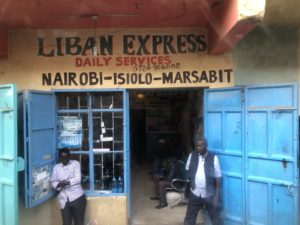
It was therefore with a sense of trepidation that I boarded the Liban bus for Marsabit. The bus in a daily lifeline for the town of Marsabit brining not only passengers but goods for shops in Marsabit. These goods are piled high on top of the bus.
My fellow passengers and the staff couldn’t have been nicer. They said that foreigners were scarse up these parts and that they never had foreigners on this route
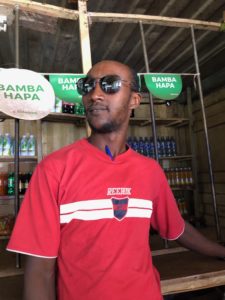
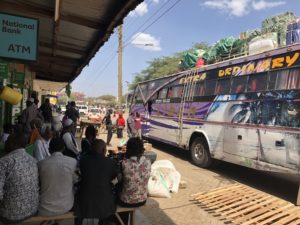
The bus made a stop overy 3 or 4 hours for tea and food. Everyone sat together and chatted. As expected there were numerous police checks on the road between Nairobi and Isiolo.
But at Isiolo we took on three armed guards for the bandit country, through Samburu up to Marsabit.
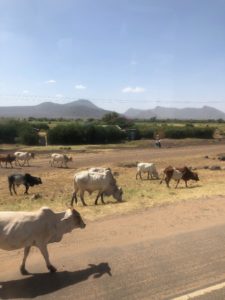
It seemed everyone on the bus was chewing tooth sticks, and certainly their teeth looked a lot whiter and straighter than my own. Maybe I should try them instead of expensive toothbrushes and toothpaste. When the bus ocassionally sotp to let passengers on and off, bundles of these sticks were bought and sold through the bus windows.
The staff also spent much of the journey chewing chat/quat or miraa as it’s called locally.
It turned out to be one of the cash crops grown by my friend in Marsabit. It is legal in Kenya but banned in many other countries as a controlled drug. I tried some of it but it was disgusting and I spat it out.
I was pleased to see the driver was not chewing it. He had the tooth stick in his mouth for much of the journey.
We crossed the equator somewhere near Nanyuki and had some lovely views of Mount Kenya out of the right side of the bus as we went through Meru County.
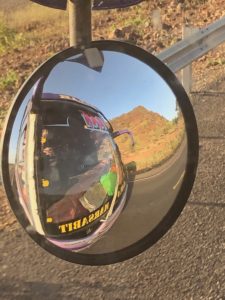
As we left Isiolo with our guards the atmosphere on thebus and the view out of the window changed. This was the Kenya that I remembered, the scrub, the small herds of goats and cattle with accompanying small boys with sticks.
The passengers became more excited the nearer to Marsabit we got, and the sound of chatter intesified. More laughter could be heard and the muic was turned up. There was a sense of excitement as home came into view – Marsabit, perched on top a n old volcano. It made me excited too.
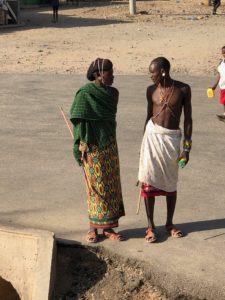
The staff was very friendly and I was put into the front seat next to the driver for the final two hours and had fantastic views, not just of the new Chinese road but of the rocks and eventually of the Marsabit hill. I also got a good view of the shrine to the Chinese road builder who had been shot by Samburu bandits!
The more north we got, the more tribal people appeared on the side of the road and in towns where we stopped. In Merille there were many such people and here we picked up people in bright costumes who had been dancing at a festival there.
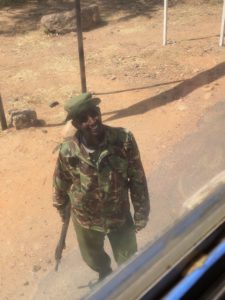
One of the passengers near me asked me what I was planning on doing in Marsabit. My old friend (who shall remain anonymous) had asked me not tell anyone that I was visiting him. He is a minority tribe in Marsabit and when tribal problems flare up in the area, he has come under fire (literally) in his home. It would make trouble for him if the locals knew he had a foreigner visiting.
This bus trip was the best I took on this trip to East Africa. Up to Isiolo the views were not so exciting but after that point things changed, we became like one family on the bus. The passengers, staff and even the soldiers were very friendly. In any case, they all knew each other living in Marsabit – they were all neighbours. That’s what made the experience great, I was part of a larger group of friends.
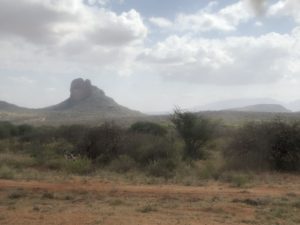
The other bus journeys I took in East Africa were miserable and full of unfriendly staff and silent unconnected passengers.
They may have been more comfortable buses in Uganda and Rwanda but there was more excitement and life on this Liban bus, the main artery through which people and goods flow between Marsabit and Nairobi.
And it seemed quite safe – safer certainly than taking a private car up that road. Nobody is going to attack a bus full of locals with armed guards on board.